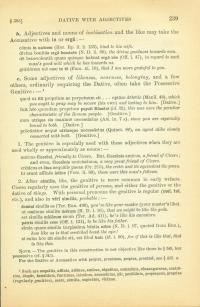383. The dative is used after adjectives or adverbs, to denote that to which the given quality is directed, for which it exists, or towards which it tends.
Note— The dative with certain adjectives is in origin a Dative of Purpose or End.
384. The dative is used with adjectives (and a few Adverbs) of fitness, nearness, likeness, service, inclination, and their opposites.1
Nihil est tam nātūrae aptum. (Lael. 17)
Nothing is so fitted to nature.
Nihil difficile amantī putō. (Or. 33)
I think nothing hard to a lover.
Castrīs idōneum locum dēlēgit. (B. G. 1.49)
He selected a place suitable for a camp.
Tribūnī nōbīs sunt amīcī. (Q. Fr. 1.2.16)
The tribunes are friendly to us.
Esse propitius potest nēminī. (N. D. 1.124)
He can be gracious to nobody.
Māgnīs autem virīs prosperae semper omnēs rēs. (id. 2.167)
But to great men everything is always favorable.
sēdēs huic nostrō nōn importūna sermōnī (De Or. 3.18)
a place not unsuitable for this conversation of ours
cui fundō erat affīnis M. Tullius (Tull. 14)
to which estate Marcus Tullius was next neighbor
convenienter nātūrae vīvere (Off. 3.13)
to live in accordance with nature
(ὁμολογουμένως τῇ φύσει)
Note 1— So, also, in poetic and colloquial use, with īdem.
Invītum quī servat idem facit occīdentī.
He who saves a man against his will does the same as one who kills him.
Note 2— Adjectives of likeness are often followed by atque (ac as). So also the adverbs aequē, pariter, similiter, etc. The pronoun īdem has regularly atque or a relative.
sī parem sapientiam habet ac formam (Plaut. Mil. 1251)
if he has sense equal to his beauty
(like as his beauty)
Tē suspicor eīsdem rēbus quibus mē ipsum commovērī. (Cat. M. 1)
I suspect you are disturbed by the same things by which I am.
385. Other constructions are sometimes found where the dative might be expected.
a. Adjectives of fitness or use take oftener the accusative with ad to denote the purpose or end; but regularly the dative of persons.
aptus ad rem mīlitārem
fit for a soldier's duty
locus ad īnsidiās aptior (Mil. 53)
a place fitter for lying in wait
Nōbīs ūtile est ad hanc rem (cf. Ter. And. 287)
It is of use to us for this thing.
b. Adjectives and nouns of inclination and the like may take the accusative with in or ergā.
cōmis in uxōrem (Hor. Ep. 2.2.133)
kind to his wife
dīvīna bonitās ergā hominēs (N. D. 2.60)
the divine goodness towards men
dē benevolentiā quam quisque habeat ergā nōs (Off. 1.47)
in regard to each man's good will which he has towards us
grātiōrem mē esse in tē (Fam. 11.10)
that I am more grateful to you
c. Some adjectives of likeness, nearness, belonging, and a few others, ordinarily requiring the dative, often take the Possessive Genitive.2
quod ut illī proprium ac perpetuum sit . . . optāre dēbētis (Manil. 48)
which you ought to pray may be secure (his own) and lasting to him. [dat.]
Fuit hōc quondam proprium populī Rōmānī. (id. 32)
This was once the peculiar characteristic of the Roman people. [gen.]
cum utrīque sīs maximē necessārius (Att. 9.7 A)
since you are especially bound to both [dat.]
prōcūrātor aequē utrīusque necessārius (Quinct. 86)
an agent closely connected with both alike [gen.]
- The genitive is especially used with these adjectives when they are used wholly or approximately as nouns.
amīcus Cicerōnī
friendly to CiceroBUT
Cicerōnis amīcus
a friend of CiceroAND EVEN
Cicerōnis amīcissimus
a very great friend of Cicerocrēticus et êius aequālis paean (Or. 215)
the cretic and its equivalent the pœanHī erant affīnēs istīus. (Verr. 2.36)
These were this man's fellows. - After similis (like) the genitive is more common in early writers. Cicero regularly uses the genitive of persons, and either the genitive or the dative of things. With personal pronouns the genitive is regular (meī, tuī, etc.), and also in vērī similis (probable).
Dominī similis es. (Ter. Eun. 496)
You're like your master
(your master's like).ut essēmus similēs deōrum (N. D. 1.91)
that we might be like the godsEst similis mâiōrum suom. (Ter. Ad. 411)
He's like his ancestors.patris similis esse (Off. 1.121)
to be like his fatherSīmia quam similis turpissima bēstia nōbīs! (N. D. 1.97, quoted from Enn.)
How like us is that wretched beast the ape!Sī enim hōc illī simile sit, est illud huic. (id. 1.90)
For if this is like that, that is like this.Note— The genitive in this construction is not objective like those in § 349, but possessive (cf. § 343).
For the dative or accusative with propior, proximus, propius, proximē, see § 432.a.
Footnotes
2. Such are aequālis, affīnis, aliēnus, amīcus, cōgnātus, commūnis, cōnsanguineus, contrārius, dispār, familiāris, fīnitimus, inimīcus, necessārius, pār, pecūliāris, propinquus, proprius (regularly genitive), sacer, similis, superstes, vīcīnus.


